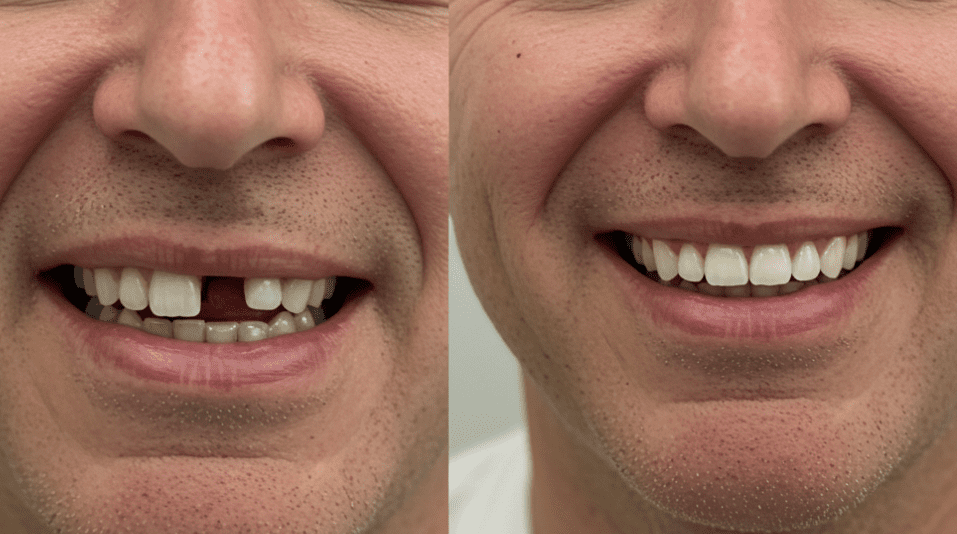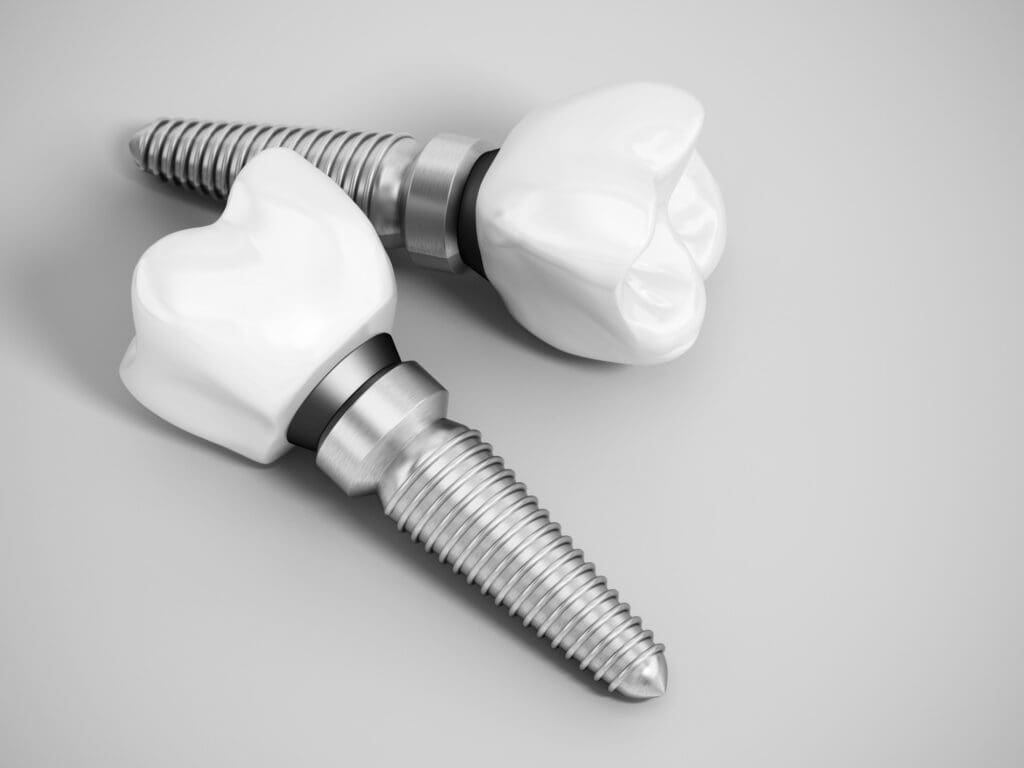Missing teeth can affect both your long-term dental health and how you feel about yourself. Replacing your missing teeth will keep your smile looking good and working properly. Gaps in your teeth can lead to more dental problems later on.
When you replace missing teeth, you are preserving your smile and help your mouth work well. Dental implants are a great option because they feel and act like natural teeth. They don’t compare to any other tooth replacement option.
Dr. Hieu Nguyen offers dental implants in Cary, NC, as a restorative dental treatment for patients with missing teeth. Dr. Nguyen will explain every step of the treatment process so that you feel comfortable in his care. Our Cary dental office also offers many other dental services to patients with various dental issues.

What are Dental Implants?

Dental implants can replace missing teeth, from one to many. A tooth implant is a small titanium post that a dentist surgically inserts into your jawbone. With tooth implants, you can replace missing teeth with artificial teeth that look and feel like your natural ones.
After placement, the bone heals and fuses with the post to replace the natural tooth root. This forms a strong base for a restoration like a crown or dental bridge. You will need a bone graft if your bones are too weak, have damage, or are too thin to heal properly on their own.
A tooth implant is the best way to support a dental restoration and replace missing tooth roots. The implant itself is one of three parts that make up the entire implant restoration. The posts, abutments, and artificial teeth work together to recreate the natural tooth structure.
A dental implant usually consists of titanium, a compound that can fuse with human tissue. The dentist places the implant in the jawbone to create a stable foundation for the dental restoration. As your mouth heals, the bone grows around the titanium post.
Dental Implant Size Options
Dental implant fixtures are available in many shapes and sizes. They can accommodate different locations along the top and bottom arch.
- A standard dental implant ranges in size from about 3.4 mm to 4.2 mm in diameter. These are typically placed towards the front of the mouth because they are skinnier and shorter.
- A wide platform dental implant ranges in size from about 4.5 mm to 6 mm in diameter. The dentist primarily places them in the back of the mouth.
- A mini dental implant has a very narrow body, ranging in size from 1.8 mm to 3.3 mm in diameter. A dentist places these when there isn’t enough space in between the tooth roots and a standard implant will not fit. Dentists can also use them for patients who lack sufficient bone density or have bone tissue issues.
The Benefits of Implant Dentistry: The Better Option for Your Oral Health
Dental implants have a high success rate and provide patients with a permanent option for tooth loss. Compared to dentures and dental bridges, they offer even more benefits. Unlike bridges or dentures, dental implants provide a permanent solution that looks, feels, and works like natural teeth. This can boost your confidence and improve your quality of life.
Implants are durable and long-lasting, often lasting a lifetime with proper care. This can save you time and money because you don’t need to replace or adjust them like other options.
Some other reasons our patients choose dental implants include:
- Ease when eating and speaking
- Simple maintenance
- Secured in place (no taking them in and out)
Dental implants also help prevent bone loss in the jaw, which can happen when a tooth is missing and you don’t replace it. Implants stimulate the jawbone like a natural tooth root to maintain bone density and keep the structure of your face intact.
Additionally, dental implants do not require any changes to the surrounding teeth. Unlike bridges that may need adjacent teeth to be filed down for support. This means your natural teeth stay healthy and untouched.
Affordable Dental Implants in Cary, North Carolina
You may be interested in implant dentistry but hesitate to proceed with the procedure because of cost concerns. At Kildaire Family and Cosmetic Dentistry, we offer a few different financing options. You don’t have to choose between a beautiful healthy smile and your wallet.
We accept most dental insurance plans and will gladly file your claim to maximize your benefits. However, please understand that insurance plans are different and you will be responsible for the balance of your dental implant treatment.
If you do not have dental insurance, we have our in-house KFD plan. This plan gives members 15% off implant restorations in addition to other perks. To learn more about our in-house dental plan, see Payment and Insurance. Additionally, we work with CareCredit financing for patients who qualify.
Patient Review
Dental Implants FAQs
Dental implants are a great way to replace missing teeth, but if you have questions about the treatment, you are not alone. Keep in mind that it’s a long process that involves surgery and a large upfront investment. To start, we suggest reading through our frequently asked questions about dental implants to learn more about them. If you have further concerns or questions, please feel free to contact us during regular business hours.
Are teeth implants permanent?
Dental implants are permanent dental restoration because the implant itself fuses with the jawbone. This is what makes them quite durable. Some patients have dental implants for their lifetime. In general, dentists consider them a permanent option, unlike other restoration solutions.
Will teeth implants help my gums?
Rather than saying that dental implants will help your gum, the reverse is truer. Dental implants require healthy gums because the gums need to support the implant post. Dental implants do help your jawbone, though, because they stimulate the bone to grow as natural tooth roots do. Without that stimulation, the bone can deteriorate.
How are dental implants fitted?
The dental implant process is a two-step process. First is the surgical portion, where the dentist places the implant post (the part that acts as a tooth root) into the jawbone. This post will attach to the bone to create a healthy, stable foundation.
Once that occurs, it’s time for phase two. This is where Kildaire Family and Cosmetic Dentistry comes in! We’ll create a custom implant restoration and prosthetic that matches the appearance of natural teeth. Then Dr. Nguyen will attach the prosthetic on top of the post and complete the procedure.
How painful is tooth implant surgery?
Dental implant surgery can cause discomfort, but most patients don’t consider it painful. A dentist or oral surgeon will perform the procedure under local anesthesia. This ensures the patient doesn’t feel pain during the process.
However, patients can expect some discomfort and swelling after the implant treatment. This post-operative pain is usually manageable with over-the-counter pain relievers and declines within a few days. Follow your dentist’s post-operative instructions to minimize any complications or discomfort.
Can you still get tooth implants with bone loss?
Tooth implants are an option even with bone loss. If you don’t have sufficient bone to support the implant, your dentist will recommend bone grafting to increase the jawbone. This provides a stable foundation for the implant. However, the success and approach depend on the severity of bone loss and other individual factors.
Can you get dental implants if you have periodontal disease?
If you have periodontal disease, you can have a dental implant procedure. However, you must first work with a periodontist or dentist to treat and manage your periodontal disease. Active gum disease can compromise the success of the tooth implant. After treatment, sufficient healing time is vital before pursuing implants.
Schedule an Appointment Today
Do you want to replace your missing teeth with a stable restoration? Your oral health is important to us. Call Kildaire Family and Cosmetic Dentistry at 919-823-7107 to receive dental implants today. Request an appointment with Dr. Nguyen on our website.
Visit our other dental implant pages to learn more about the number one recommended way to replace missing teeth. To learn more about our implant dentistry, see:
